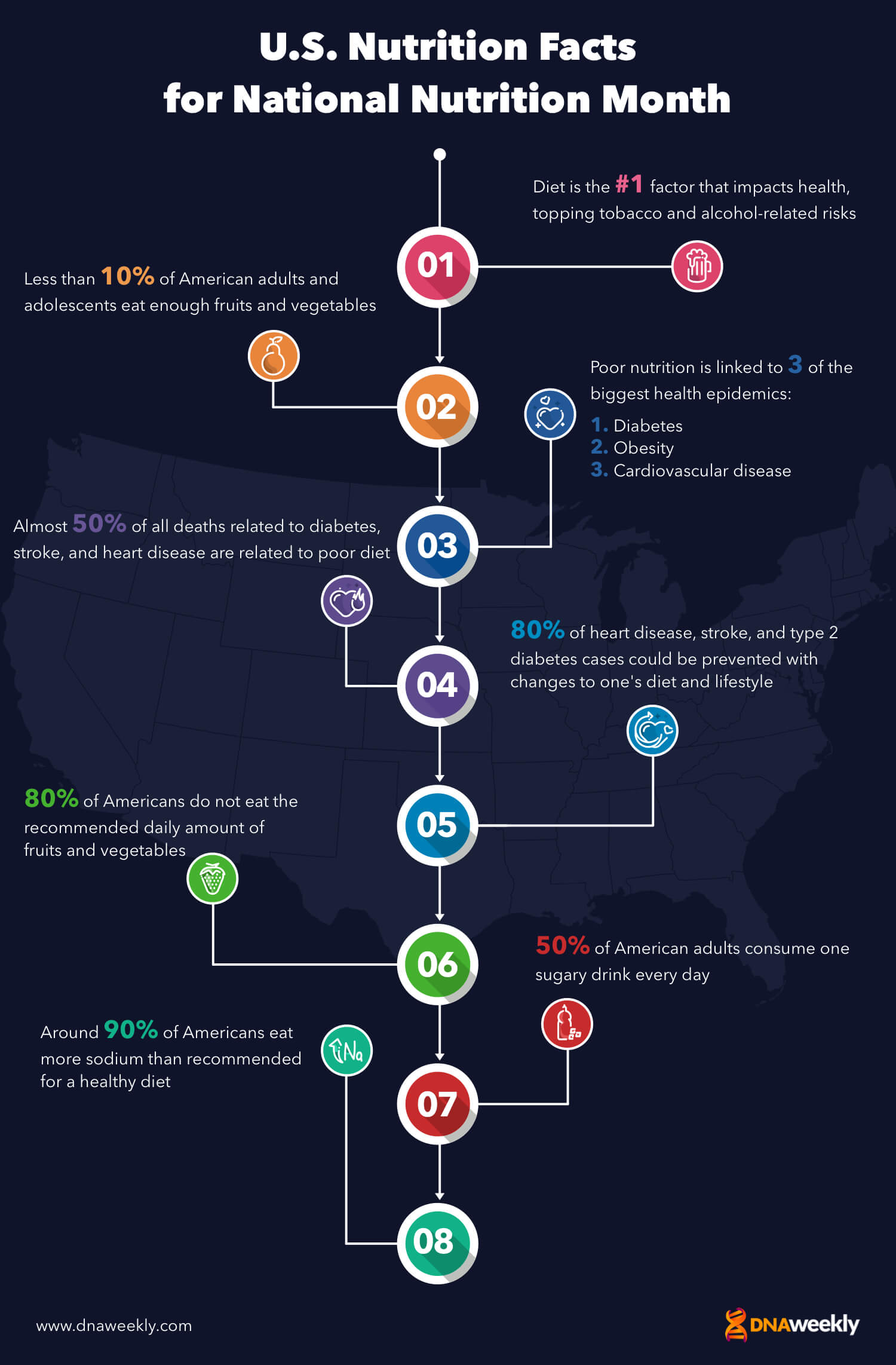
question you probably have is, “When is national nutrition month?” Every March! Created by the Academy of Nutrition and Dietetics, this month-long event encourages Americans to make informed choices about their diets and lifestyles by developing sound eating and physical activity habits.
Here’s everything you need to know about the event and how you can get involved.
What Is National Nutrition Month?
This annual event dates back to 1973, when the Academy of Nutrition and Dietetics launched National Nutrition Week. Seven years later – and thanks to the soaring popularity of the week-long campaigns, the Academy launched the more ambitious National Nutrition Month. Every year, there is a different theme but one aim: to help people learn to eat well.
There are many ways in which you can take part in the campaign. You may want to help raise awareness by spreading the message on social media, organizing a food donation, or planning a cooking demo. See the Academy’s long list of 40 ideas for getting involved.
Don’t forget that the best way to honor the campaign is to make simple, sustainable, healthy changes to your own diet. Just like many things in life, healthy nutrition begins at home.
March 2020 Theme: “Eat Right Bite by Bite”
March is National Nutrition Month, and the campaign stays fresh – just like the food you should be eating – by having a different theme every year. The theme for March 2020 is “Eat Right Bite by Bite.” This is broken down into weekly messages:
Week One: Vary Your Diet
There are always ways to improve your current diet. In the first week of National Nutrition Month, you can make a positive change by including more varied foods into your everyday meals. Don’t forget to read the Nutrition Fact Panels on the foods you buy, so you can make informed decisions about what you do and don’t eat.
Week Two: Meal Planning
Preparing meals to eat at home, school, or work is a growing trend that is definitely worth trying out. During the second week of the 2020 National Nutrition Month, the messaging is all about planning your meals. Learning healthful recipes and buying only the ingredients you need are good first steps. And if you pre-make food, you’ll be less tempted to order out – saving money and calories.
Week Three: Cook & Prep
Whether you’re a wizard in the kitchen or a complete newcomer, learning how to make delicious meals will enrich your life as well as your diet. In the third week of the campaign, why not take the time to learn some new techniques? This is something fun you can do with the whole family, or invite friends over to share and taste test.
Week Four: Visit an RDN
In the final week of National Nutrition Month 2020, it’s time to take things to a whole new level. A Registered Diet Nutritionist (RDN) can give you personalized nutrition advice to support your health goals. Since we’re all different, search for a professional that specializes in your unique dietary needs (including any food intolerances or restrictions you may have).
Important Nutrition Stats

What Are the Harmful Effects of Poor Nutrition?
Nutrition matters when it comes to your everyday wellness. If you fail to give your body the vitamins and minerals it needs, it could harm your health. Let’s look at three of the potentially negative effects of poor nutrition.
Obesity
One of the major markers for obesity is poor nutrition. Since obesity has almost tripled globally since 1975, this is a crucial issue that we need to tackle. Being overweight is associated with a whole range of health risks, including high blood pressure, heart disease, cancer, kidney disease, fatty liver disease, and more. Failing to eat healthy foods – and overeating in general – can contribute to gaining weight.
Cancer
According to the World Health Organization, a massive 30% of all cancer cases are linked to poor dietary habits. Information suggests that increasing your consumption of plant-based foods and eating less red and processed meats could reduce your risk. While there is no one direct cause of cancer, leading a healthy lifestyle and adopting a diet that supports your wellness will help you protect yourself.
Poor Brain Function
The nutrients you get from the foods you eat have a direct impact on your brain and how it functions. Failing to feed your body in the right way can impair your cognitive abilities. The advice is to always eat brain-healthy foods such as fatty fish, leafy greens, and berries.
How to Check If Your Nutrition Is on Track
Now that we’ve looked at why nutrition is important, let’s talk about how you can stay on the right nutritional track. Here are three ways in which you can get started.
Look Out for Red Flags
It might sound obvious, but one of the best ways to determine if your nutrition is on track is to keep an eye on your health. So, look out for the red flags that could mean you have a nutrient deficiency.
According to information from Rush University, these signs include hair loss, burning sensations in your feet or tongue, slow-healing wounds, bone pain, an irregular heartbeat, and poor night vision. If you notice any of these symptoms, speak to a doctor and identify the cause.
Take an At-Home (DNA) Test to Assess Your Nutritional Needs
Everyone’s DNA is different, and it determines how your individual nutritional needs may differ from your neighbors’. Getting your DNA tested can tell you a lot about what nutrients you need and what foods would be best to avoid. Here are ten of the top companies to offer DNA and other kinds of at-home testing for potential or actual nutritional deficiencies:
Vitagene: This company offers a Vitality Bundle that analyses your DNA sample to provide a comprehensive diet report. It also considers your lifestyle factors, any medications you take, your medical history, and your health goals, to provide you with supplement recommendations.
Living DNA: The Wellbeing Kit tests your DNA to report on how your metabolism works and how your body responds to vitamins and other ingredients. It also offers nutrition ideas to boost your health.
EasyDNA: The NutriFit Health & Fitness DNA Test reports on the micronutrients (vitamins) and macronutrients (proteins, fats, and carbohydrates) that your DNA suggests you may need. It analyses 14 metabolic properties, and it provides personalized diet advice.
HealthCodes DNA: The available Nutrition Panel analyses your micronutrient needs and your genetic traits for food metabolism. The test covers 16 traits in total, and a supplementary Wellness Panel kit reports on macronutrients.
Everlywell: This company offers several lab tests that can analyze your DNA and your blood to detect everything from low vitamin D levels to genetic predispositions to food sensitivities. The Food Sensitivity Comprehensive Test measures your body’s immune response to 204 different foods and gives you a full report.
LetsGetChecked: Vitamin deficiency tests are not DNA tests that analyze your predispositions to low vitamin levels; they’re at-home blood tests that check for actual low levels of vitamin D, vitamin B12, and vitamin B9 (folate). This company also offers an iron test that analyses your total iron-binding capacity (TIBC), iron levels, transferrin saturation, and ferritin levels.
Gene Food: This company doesn’t do its own DNA tests. You can upload your raw DNA data – from a previous test with a provider such as 23andMe or AncestryDNA – to determine which diet plan will suit you best. You’ll get simple rules to follow, such as “choose Omega3 fats over saturated fats,” and this is the company to check out if you’re interested in following a Keto or Paleo diet in particular.
24Genetics: The Nutrigenetics test looks for genetic predispositions to food tolerances (or intolerances) and how your body is likely to utilize vitamins, minerals, and other substances, such as Omega 3. You also get a detailed analysis of your appetite, metabolism, and taste preferences.
5Strands: The “Affordable Testing” option identifies any substances you may be intolerant to, including 650 food and environmental items. Unlike DNA testing companies that typically test a saliva sample (or sometimes even blood), this one asks for a totally non-invasive hair sample that also allows it to identify 115 nutritional deficiencies.
Vitl: The DNA Nutrition Kit aims to determine the right vitamins for your body’s needs. It provides more than 40 in-depth reports and personalized advice from a qualified nutritionist. You’ll learn about your appetite (including your predisposition to binge-eating), your body’s use of dietary saturated fats, your reaction to alcohol, and your intolerances. You can then put the valuable information to work.
Enlist the Help of a Nutritionist
Why not get the advice of an expert? If you’re worried that you’re failing to hit your nutrition goals, enlisting the help of a Registered Diet Nutritionist (RDN) will help. You can speak to him or her about your current health and diet, and the expert will be able to tailor a meal plan that suits your needs and works with your current lifestyle. Needless to say, working with a nutritionist can be expensive, so this tip won’t suit anyone who is on a tight budget.
How to Improve Your Everyday Nutrition
If you think you’re lacking nutrition, it’s important not to panic. Talk to your doctor about why you’ve come to that conclusion, and see what advice he or she has to offer (or which expert they can point you toward). You can also try some of the following tips to try and enhance your nutrition yourself.
Keep a Daily Food Diary
Do you know what you eat on a daily basis? For example, are you a secret snacker? Keeping a daily food diary can help you keep track of the food you’re eating, and therefore look for ways to improve your diet, because – ultimately – you can’t change what you don’t measure. If you’re looking to lose weight, your food diary can also help you monitor your daily calorie intake.
Reduce Your Red Meat Consumption
Eating large amounts of red meat has been linked to higher risks of heart disease, colon cancer, and type 2 diabetes. So, if you’re a meat-lover, it could be time to cut back when you can. Rather than eating this ingredient every day, you could try restricting it to only special occasions.
Eat Nutrient-Rich Ingredients
Whenever you’re choosing ingredients for your everyday diet, consider the nutrients they offer your body. Choosing nutrient-rich products, such as leafy greens, whole grains, and fruit will help you boost your intake of the right kinds of nutrients. Make a habit of including these ingredients in meals and buying them when you head to the grocery store. It could make a big difference.
The Takeaway! (Healthy, of Course)
If you’re ready to improve your nutrition once and for all, March could be the time to make a start in conjunction with National Nutrition Month. That said, eating healthy isn’t something you should be doing for only one month of every year. Make it a whole-year goal, and get started today!

